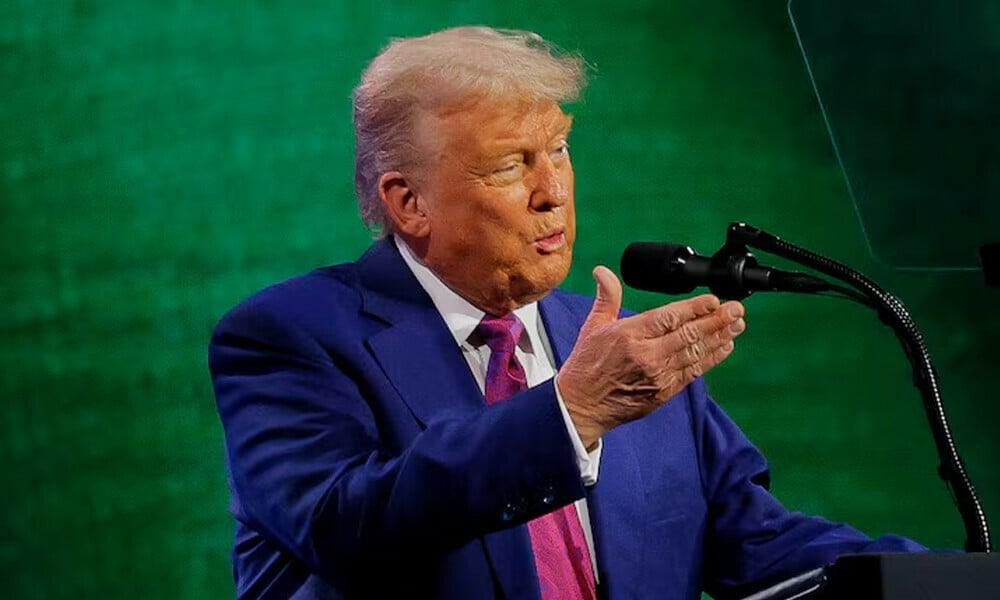US President Donald Trump has described Pakistanis as “brilliant people” and expressed a strong desire to expand bilateral trade while claiming credit for averting what he called an almost nuclear conflict between Pakistan and India.
In a speech in an interview with Fox News, Trump said his intervention helped bring the two nuclear armed neighbors back from the brink of the war after a period of intense military escalation.
“It would be a nuclear war, I think, or close … and now everyone is happy,” Trump said, referring to tensions between the South Asian rivals. “Missiles were fired, retaliation was underway, and both sides escalated quickly.”
Trump credited his administration diplomacy behind the scenes to stop the crisis and said that engaging both sides through trade was part of his peace -building strategy.
“I told my people to call them up – let’s start trading right away,” he said.
The president said he had “big conversations” with Pakistani leadership and expressed optimism about future cooperation. “They would very much like to act. They are brilliant people and make incredible products. We don’t deal with them much,” Trump said.
He noted that despite positive relations, trade between the United States and Pakistan remains limited. “We can’t forget them because it takes two rectangles,” he added in what seemed to be a miss of his tongue while trying to emphasize the importance of cooperation.
Trump took the opportunity to criticize India’s economic policies and called it “the country with the highest tariffs in the world.” However, he acknowledged that India had shown emergency preparedness to reduce customs in his trade conditions with Washington.
“India … They make it almost impossible to do business,” Trump said. “Do you know they are willing to cut 100% of their tariffs for the United States?”
Trump continued to characterize his diplomatic efforts as one of the most significant results of his presidency.
“A greater success than I have ever been honored,” he said. “It’s great nuclear forces. It’s not just little powers and they were angry.”
By reflecting on the danger of standoff, Trump described the escalation as dangerously close to a nuclear exchange.
“It was often too tat. It got deeper – more missiles. Everyone said” stronger, stronger “to a point where the next one will be, you know what? The word,” he said.
“It’s the n -word. It’s a very ugly word, not? In many ways. The word used in the nuclear sense -that’s the worst thing that can happen,” he continued. “And I think they were very close. Haded was big.”
Trump framed the episode as a case where diplomacy combined with financial commitment prevented a global disaster.
“I use trade to run scores and to make peace,” he said.
Completed the interview, Trump portrayed himself as a president who delivers results. “We worked not only for world peace, but also for financial progress,” he said. “Trade is a tool for peace.”
The latest escalation between Pakistan and India began on April 22 when an attack in the IIOJK Resort city of Pahagam killed 26 people. India immediately accused Pakistan of the incident, despite having provided no public proof.
In response, India took on a number of hostile actions the next day of April 23, including the suspension of the 65-year-old Indus Waters Treaty (IWT), which canceled Visa for Pakistani citizens, closes the Wagah-Attari border transition, ordered the shutdown of Pakistan High Commission in New Delhi and the reduction of diplomatic staff at each other’s amount.
Pakistan strongly rejected the accusation and did not call it substantiated, but took mutual measures through his National Security Committee (NSC). These included stopping trade in India, ending Pakistani airspace to Indian aircraft and other recesses.
Tensions further escalated in the early hours of May 7, when missile strikes hit six cities in Punjab and Azad Jammu and Kashmir (AJK), destroy a mosque and kill dozens of civilians, including women, children and the elderly.
In a rapid military reaction, Pakistan’s armed forces shot Indian war plane, including three Rafale jet aircraft, which is largely considered an important asset to the Indian Air Force. Over the following two days, India launched waves of Israeli made drones, which were also neutralized by Pakistan’s military.
The confrontation intensified again in the early hours of May 10 when India targeted several Pakistani Airbases with missile attacks. In contrast, Pakistan Operation launched Bunyan-Un-Marsoos, which damaged Indian military installations, including missile storage sites, airbases and other strategic goals.
On Saturday night, US President Donald Trump announced that a ceasefire had reached after an intense diplomatic effort overnight. Minutes later, the agreement was confirmed separately by Pakistan’s Foreign Minister Ishaq Dar and the Indian Foreign Secretary.



